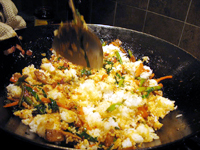| How much Oil is Safe?
With more and more women going to work, the cooking practices have undergone a drastic change. Most families are in a hurry and convenience has overruled what is correct and healthy. To cook anything faster, you need to use more oil. Also, with cooking being largely handled by uncaring cooks or maids, the use of oil has become liberal and excessive. More and more families are finding that it is convenient and faster to eat or order from cafés, restaurants etc.
 However, they forget that while restaurant food may seem tastier, it is always more oilier and less healthy. The bottom line is oil or fat consumption has sky rocketed in the past 30 years or so. Many believe that only high cholesterol diets can lead to heart disease but we have seen that even high oil consumption or high total fat consumption can lead to heart disease. High oil intake means high calorie intake. All extra calories are converted to a fat called triglyceride, which can also block the arteries. Both cholesterol and triglyceride levels rising in the blood are dangerous as these fats get deposited on the inner walls of the arteries and form blocks, which will finally result in a heart attack. Also high fat diets lead to obesity which again puts a strain on the heart as you may be pushing the body to carry around a daily extra baggage of 5-10 or even 20-30kg. However, they forget that while restaurant food may seem tastier, it is always more oilier and less healthy. The bottom line is oil or fat consumption has sky rocketed in the past 30 years or so. Many believe that only high cholesterol diets can lead to heart disease but we have seen that even high oil consumption or high total fat consumption can lead to heart disease. High oil intake means high calorie intake. All extra calories are converted to a fat called triglyceride, which can also block the arteries. Both cholesterol and triglyceride levels rising in the blood are dangerous as these fats get deposited on the inner walls of the arteries and form blocks, which will finally result in a heart attack. Also high fat diets lead to obesity which again puts a strain on the heart as you may be pushing the body to carry around a daily extra baggage of 5-10 or even 20-30kg.
Apart from the above factors, which contribute to rising instances of heart disease, genetics also plays a major role. One woman may be able to eat ‘mithai’ made of ghee daily and see normal blood cholesterol levels. She is called a hypo-responder to cholesterol in her diet. Another woman may eat ‘mithai’ just once a week and her levels may shoot above the normal mark. She is called a hyper-responder to cholesterol in the diet.
In day-to-day cooking, the oil intake per person should not exceed three-four teaspoons of unsaturated oil. Also, there is no protection for your heart without regular exercise or walking. Finally, high fiber foods like fruits and raw salad have to be a part of our daily diet. Fiber hinders fat absorption from the meal. For example, if your meal contains 10 gm fat and salads or high fibre ‘rotis’ accompany the meal, then the fiber in the salad or the roti will hinder and remove a small amount of this fat from being absorbed. Also, fiber helps to break down cholesterol and triglycerides as the body has to work harder to digest the fiber.
An important factor to bear in mind is that oil is ‘Fat’ and gives us nine cals per gram or 45 cals for 1 teaspoon (5 gms). There are many oils in the market whose label reads no cholesterol and people mistake this for meaning that it contains no calories too. All oils have loads of calories and hence are dangerous when used too liberally. To stay healthy, reduce total fat consumption. Spend time and effort to train cooks and maids to use less oil. Opt for non-stick cookware and order or eat from restaurants not more than once a week. Ideally a family of four should not use more than two liters of oil per month. |